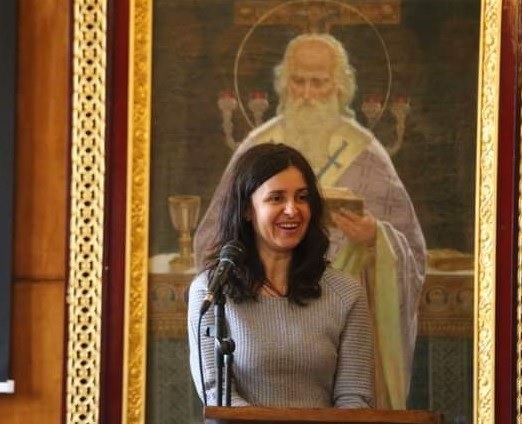 |
| Ekaterina Tarpomanova |
Albanian language and linguistic connections with Bulgarian, Romanian and Greek
After graduating from the Department of Balkan Studies at Sofia University, I started my doctorate with the theme "Functions of pronouns in Balkan languages". My mentor was the prominent Balkanologist, prof. Petja Asenova. My study includes the four languages of the Balkan language connection - Bulgarian, Albanian, Romanian and Greek, which have developed common features in their grammatical structure thanks to many years of intensive contacts between the peoples and languages of the Balkans. This coexistence of societies and cultures in the Balkans was the reason for the formation of the linguistic bond, or Sprachbund. So, my study is a part of Balkan linguistics - the scientific field, which studies the processes in the Balkan linguistic connection. The Albanian language is an important part of both my doctoral dissertation and Balkan linguistics in general because without knowing the processes in this language, the processes in the Balkan Sprachbund cannot be explained. On the other hand, it is a great challenge for researchers. Since Bulgarian is part of the Slavic languages, Romanian - of the Romance languages, for Greek we have very early written sources dating back to BC, the development of these languages over the centuries is more or less clear, while for Albanian we always work with hypotheses. But that is exactly what, in my opinion, makes it interesting and attractive to researchers.
History of the Albanian language at the University of Sofia
Albanian language in the department of general Indo-European and Balkan linguistics
The Department of General, Indo-European and Balkan Linguistics is the one that administers the branch of Balkan Studies. We are nine professors, specialists in various fields of linguistics and Balkan studies. It is understood that we have many collaborators from the faculty, university and other institutions because the branch program includes different subjects. Students are introduced to the history of the entire Balkan Peninsula from ancient times to the present day in the context of developments in Europe, the Paleo-Balkan languages and the ancient classical languages, such as Latin and ancient Greek, ancient literature, Renaissance literature, modern literature of Balkans, linguistics and the theory of linguistic contacts. To ensure the quality of this ambitious program, we work with the most prominent specialists in the country. Our goal is to motivate the students and instill in them a love for the Balkans, but a love that stems from the deep understanding of the processes that take place in this interesting corner of Europe. After the fall of totalitarian regimes and the opening of Europe and the world, there are many opportunities for student mobility. Thus students have the opportunity to visit neighboring countries in the Balkans, meet the culture of neighboring peoples, and make contacts with young people their age. Together with our students, we organize many international scientific conferences, in which we usually have many participants from Albania and Kosovo. We recently established a school for Albanian doctoral students in the Albanian language, some of them have already successfully defended their doctorates at our university before international juries.
Balkanologists, a contribution to the European integration of our countries
For now, the interest in the Balkan Studies branch is stable. Every year we accept 15 students, who pass the five-year cycle of studies and receive a master's degree in the field of Balkan studies. Then there are many opportunities for professional realization - in diplomacy, journalism, science, state administration, European institutions. Specialists in the field of Balkan studies are indispensable in our times, when economic, trade and cultural contacts between the Balkan countries are free and can be deepened more and more. Balkanologists can also contribute to the European integration of our countries. So I think our branch will continue to be attractive to young people who want to make these connections between the Balkans and Europe.
Who is the albanologist Ekaterina Tarpomanova?
I am an associate professor in the Department of General, Indo-European and Balkan Linguistics of the Faculty of Slavic Philology (Sofia University St. Kliment Ohridski). I did my studies in the field of Balkan Studies. There, under the influence of my Albanian language teacher Rusana Bejleri, I started to take seriously this language. After graduating, I worked for several years in the Albanian editorial office of the Bulgarian National Radio. I started working at Sofia University in 2012. I am currently the head of the department. Working with young people inspires and provokes me. I believe I am one of those happy people who love their job. When you love of what you do, it is no longer work, it is like a hobby, something you do for fun.

